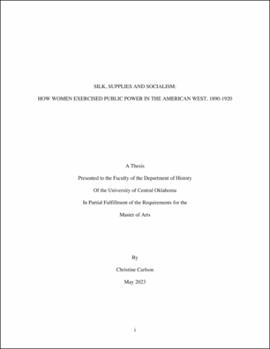| dc.description.abstract | In my thesis, I reframe the long-held assumption that because women in the United States prior to 1920 were blocked from access to the vote, women did not exercise political or economic influence in their communities. I illuminate the lives of three women from Oklahoma, Utah and Idaho, who defied historical assumptions of the "women's sphere," leveraging the fluidity of power in western states and territories during the turn of the century to wield political, religious, social and commercial influence. The history of women's political access in the American West has shown that women there had unique access to political, social, and commercial spaces in their communities and states. As women in the west expanded their assigned domestic roles, women's power and participation also grew on a national level. This new influence culminated in the national women's suffrage amendment, which passed in 1920. In Oklahoma, Idaho, and Utah, how did women navigate religious, commercial, marital, and political constructs to increase their participation in civic life, leading to state suffrage that pre-dated the national amendment? Cora Diehl Harvey was the first woman elected to territorial office when she was elected as County Assessor in Oklahoma in 1891. Her election was challenged by members of her own Populist party, and she was later sued in court in regard to a bond she was forced to sign to ensure her seat. Cora divorced her husband and traveled as a single woman with the International Brotherhood Welfare Association, a socialist advocacy group speaking on the rights of the homeless. Cora's beginnings in politics in a territory with little political construction allowed her to move outside customary domestic roles. Leah Mariah Gorton was the wife of George Washington Gorton, a Civil War pensioner in Soda Springs, Idaho. After Leah defied her parents in marrying George, together, the Gortons built a business empire in the rural community and led civil groups. Later, as George's widow, Leah retained her standing in the business community and was active in political circles. Beyond her family's joint interests, Leah grew beyond her traditional role as wife and mother and strongly influenced her community, interacting with and reacting to both the local Mormon and Presbyterian churches. Margaret Ann Caine was born in Salt Lake City in 1859, just as the Mormons were embarking on building a white American settlement in land populated by Indigenous peoples and trappers. Mormonism was straddling a line between isolationism and national participation as Margaret grew up and was educated in a culture that uniquely valued women's participation in religious spaces. Margaret was active in the state and national suffrage movements, represented Utah's women nationally at the World's Fair in Chicago and the International Council of Women in London and toured on behalf of the Utah Silk Industry, lecturing on the advantages of domestic silk production, one of her own commercial interests. As the first and only woman elected as Salt Lake County Auditor, Caine moved beyond her "sphere," working both within and outside of societal restraints to impact Utah and its economy. Harvey, Gorton and Caine all utilized the newness of western political systems to leverage influence in their communities. Though excluded from traditional political and commercial spaces, each wielded power in addition to their "feminine" domestic power within their homes. These examples reflect that western spaces provided opportunities for women to participate in their societies in non-traditional ways. In this project, I focus on understudied aspects of women's American western scholarship: contrasting access to power for women in different states, women's business' holdings and participation in commerce, and the ways women interacted with prevalent religious and social movements. By studying Harvey, Cain and Gorton, I will be able to illuminate the ways these principles actually influenced women's lives, thereby changing the gendered power balances of their communities, states, and ultimately, the nation. | |
